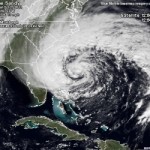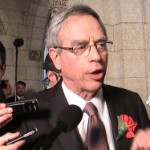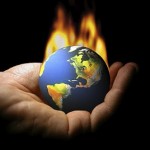2012 is 25th anniversary of worldwide Montreal Protocol to protect ozone layer.
by Stephen Leahy
Thousands of people have avoided getting skin cancer thanks to Canadian scientists who invented the UV index and the gold-standard tool for measuring the thickness of the Earth's ozone layer. But now Canada's ozone science group no longer exists, victim of government budget cuts.
"Everyone who was still left in the ozone group has been re-assigned," said Prof Thomas Duck of the department of Physics and Atmospheric Science at Canada's Dalhousie University.
In 2011 Canada unexpectedly experienced its first ever ozone hole over the Arctic. "The ozone problem is not solved," Duck told the Guardian.
This year is the 25th anniversary of the signing of the Montreal protocol, the international treaty that phased out chemicals that were destroying the ozone layer. Without the protocol skin would burn after a five-minute exposure to the sun in London or New York by the year 2065. Skin cancers would be at least 650 percent higher, Nasa has calculated.
2012 is also the 20th anniversary of the invention of the UV index that accurately forecasts UV levels. At least 25 countries' use some form of UV index to advise the public. Exposure to UV is main cause of the more than 1 million skin cancers that occur ever year according to the World Health Organisation.
Program cuts could compromise international efforts to monitor what is happening to the Earth’s protective ozone layer.
Rather than celebrate the anniversary of this vital scientific contribution, Stephen Harper's government instead choose to spend $28 million celebrating the War of 1812. The US invaded Canada when it was a British colony in 1812 and after a few battles the Americans went home.
Budget cuts to Environment Canada (EC), where the ozone science and monitoring are done, were $13.3m this year and will be $31.1m next year.
"There's been no celebration of Canada's scientific achievements. Never mind continuing to invest money into science," says Gordon McBean, a former assistant deputy minister of EC and president-elect of the International Council for Science.
"Canada can afford to do top-notch environmental science but this government has simply chosen not to make it at priority," McBean said.
The Harper government cuts to the ozone programme were completely arbitrary, he said. Scientists were never consulted and it could compromise the international efforts to monitor what is happening to the Earth's protective ozone layer.
A spokesman for Environment Canada said: "On ozone research, we have a continuing research involvement, working with the World Meteorological Organization and others, to advance the global understanding of ozone levels. Our research continues to provide the scientific basis for services to Canadians, including the UV index."
He said that ozone monitoring was still taking place, an EC scientific review is being conducted of monitoring sites, and Canada had earlier this month reiterated its commitment to continuing to host the World Ozone and UV Data Centre of the WMO.
"Anyone who knows about the UV index thinks the inventors are among the most famous scientists in the world but no one knows who we are," says Tom McElroy who created the index at Environment Canada (EC) along with fellow EC scientists David Wardle and James Kerr in 1992. All are retired now.
"We developed the UV index in 1992 to give the public information about their potential exposure," McElroy said. "It's amazing how popular it became. I think it has really saved lives."
The UV index relies on another invention by McElroy, Wardle and Kerr, the Automated Brewer Ozone Spectrophotometer, the world's most accurate ground-based ozone measurement tool. First used 30 years ago, Brewers, as they are called, are now in use in more than 45 countries and a crucial part of the global ozone monitoring network.
All of those Brewers need to be regularly calibrated by the "Toronto Triad", three EC Brewers that no longer have the appropriate scientific oversight says Duck. "This will compromise the world's ozone monitoring capability. This is a serious issue."
This article appeared in the UK Guardian.

 Stephen Leahy is an environmental journalist based in Uxbridge, Ontario.
Stephen Leahy is an environmental journalist based in Uxbridge, Ontario.




